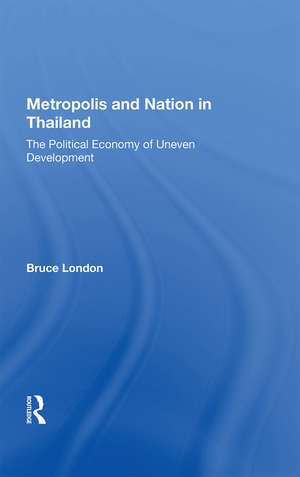Metropolis And Nation In Thailand: The Political Economy Of Uneven Development
Autor Bruce Londonen Limba Engleză Hardback – 7 iun 2019
Preț: 764.20 lei
Preț vechi: 1027.40 lei
-26% Nou
Puncte Express: 1146
Preț estimativ în valută:
146.30€ • 150.46$ • 121.37£
146.30€ • 150.46$ • 121.37£
Carte tipărită la comandă
Livrare economică 18 februarie-04 martie
Preluare comenzi: 021 569.72.76
Specificații
ISBN-13: 9780367021641
ISBN-10: 0367021641
Pagini: 158
Dimensiuni: 149 x 229 mm
Greutate: 0.45 kg
Ediția:1
Editura: Taylor & Francis
Colecția Routledge
Locul publicării:Oxford, United Kingdom
ISBN-10: 0367021641
Pagini: 158
Dimensiuni: 149 x 229 mm
Greutate: 0.45 kg
Ediția:1
Editura: Taylor & Francis
Colecția Routledge
Locul publicării:Oxford, United Kingdom
Cuprins
Westview Replica Editions -- Preface -- Metropolis and Nation: Theory and Research -- The Statistical Primate City: Bangkok, Thailand -- The Political Primate City: The Distribution of Power in Thai Society, 1850-1973 -- The National Implications of Central Decision-Making: The Policy and Politics of National Integration -- The Regional Implications of National Decision-Making: The Policy and Politics of Regional Management -- The Meaning of Parasitism: Social Class, Political Power, and the Ecology of “National Unity”
Descriere
This qualitative study of the relationships between one primate city, Bangkok, and its hinterland, the Thai nation, breaks new ground in general sociological theory, redirects the study of city-hinterland relationships, and presents an interpretation of Thai political history that departs significantly from conventional analyses. Professor London finds a direct correlation between the nature of intergroup relationships and the type of parasitism or internal colonialism evident in center-periphery relationships. He concludes that Bangkok, through the operations of its decision-making elite, has historically been parasitic on the Thai nation and that primate city parasitism is essentially a political phenomenon, more complex than has been previously suggested.
